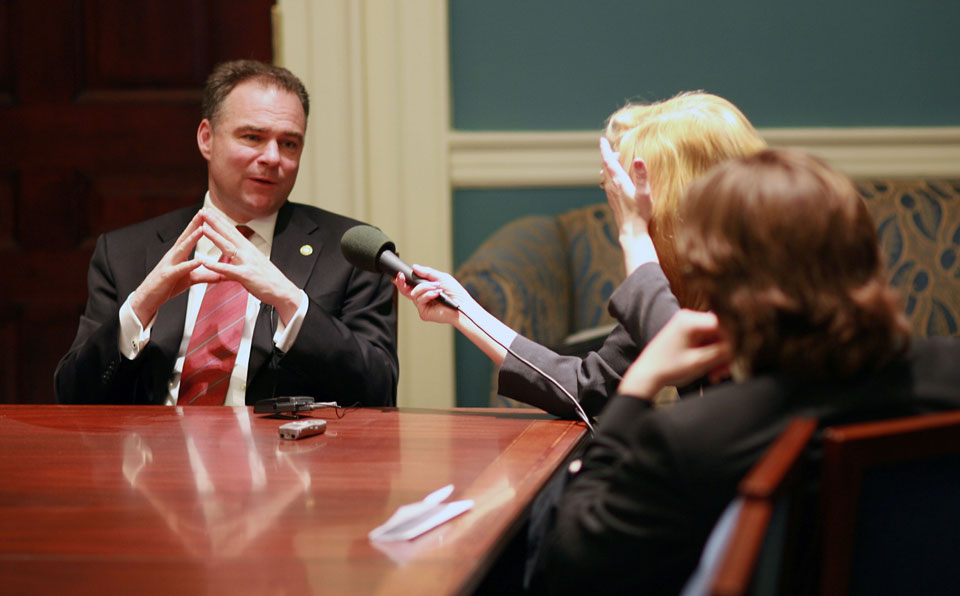This is the second in a series of posts spotlighting recently released email from Governor Tim Kaine’s administration. These posts are not meant to be comprehensive but to encourage further exploration in the Kaine administration records (electronic and paper).
Transportation was one of the issues that dominated the Kaine administration. In 2007, Kaine reached an agreement with the Republican General Assembly on a compromise transportation package that would have been the largest transportation funding increase since 1986. This week’s post focuses on this legislation, HB 3202, and the controversial abusive driver fees it contained. The legislative process is messy and complicated. John Godfrey Saxe’s quote, “Laws, like sausages, cease to inspire respect in proportion as we know how they are made,” applies to this blog post. Consider yourself warned.
House Bill 3202, Chapter 896 of the 2007 Acts of Assembly, was enacted on 4 April 2007. Through a mixture of bonds, new taxes and fees, the law was designed to generate more than $500 million in new dedicated funding for highway construction and transit capital projects as well as highway maintenance and transit operating costs. Passing this package required compromises from both Republicans and Democrats. In this series of emails from February 2007, Governor Kaine informs his senior staff of conversations he’s had with members of the General Assembly and his thoughts on finding common ground for dedicated transportation funding.
As the outline for a deal came into view, the Kaine administration reviewed HB 3202 for technical and policy concerns and refined their strategic plan. An attachment to a 9 March 2007 email to Wayne Turnage, Kaine’s Deputy Chief of Staff, contains a comprehensive technical list of concerns with the bill. Later that evening, Turnage sent Kaine the 10 March weekly transportation status report.
Turnage also described how the transportation team had, “in a very healthy way,” divided into three camps: hardliners who believed that the Republicans would not compromise and that the Governor may have to veto the bill; advisors who believed the administration was in a strong position to cut a deal with House Republicans; and a third group, unsure if the administration could cut a deal and believing the governor may be forecd to sign a flawed bill. In a 16 March 2007 email message to the transportation team, Turnage outlined the upcoming week’s transportation for the “home stretch.” On 26 March 2007 Governor Kaine discussed his main amendments to the transportation bill and answered questions from reporters. Kaine issued a statement and spoke briefly to the press on 4 April 2007 congratulating the General Assembly on the transportation funding compromise.
Success was short-lived. On 14 July 2007, Press Secretary Kevin Hall informed Kaine that “we potentially have another HUGE problem on abuser driver fees. According to LIS [Legislative Information Services], we were sent a bill that included abuser fees on out-of-state drivers…and sent down a substitute that did not.”
Within two days, an on-line petition against the abusive driver fees had over 100,000 signatures. In a flurry of emails over the next several days, the Kaine administration investigated how the change was made and prepared Kaine for a joint press conference with Speaker of the House William Howell on 19 July 2007.
The joint press conference did not end the controversy. In August 2007, a reporter requested an interview with Governor Kaine to discuss his past speeding tickets. Kevin Hall forwarded the request to Governor Kaine with a new subject line that is not “blog friendly.” You can read the exchange below.
Governor Kaine signed legislation repealing the abusive driver fees in March 2008.
The Library of Virginia’s Kaine Email Project makes the email records from the administration of Governor Timothy M. Kaine, Virginia’s 70th governor (2006–2010), accessible online. Users can search and view email records from the Governor’s Office and his cabinet secretaries; learn about other public records from the Kaine Administration; go behind the scenes to see how the Library of Virginia made the email records available; and read what others are saying about the collection. Previous posts spotlighted the state budget and the Kaine records officers. This project would not have been possible without funding provided by Congress for the Library Services and Technology Act (LSTA).
-Roger Christman, LVA Senior State Records Archivist







































































